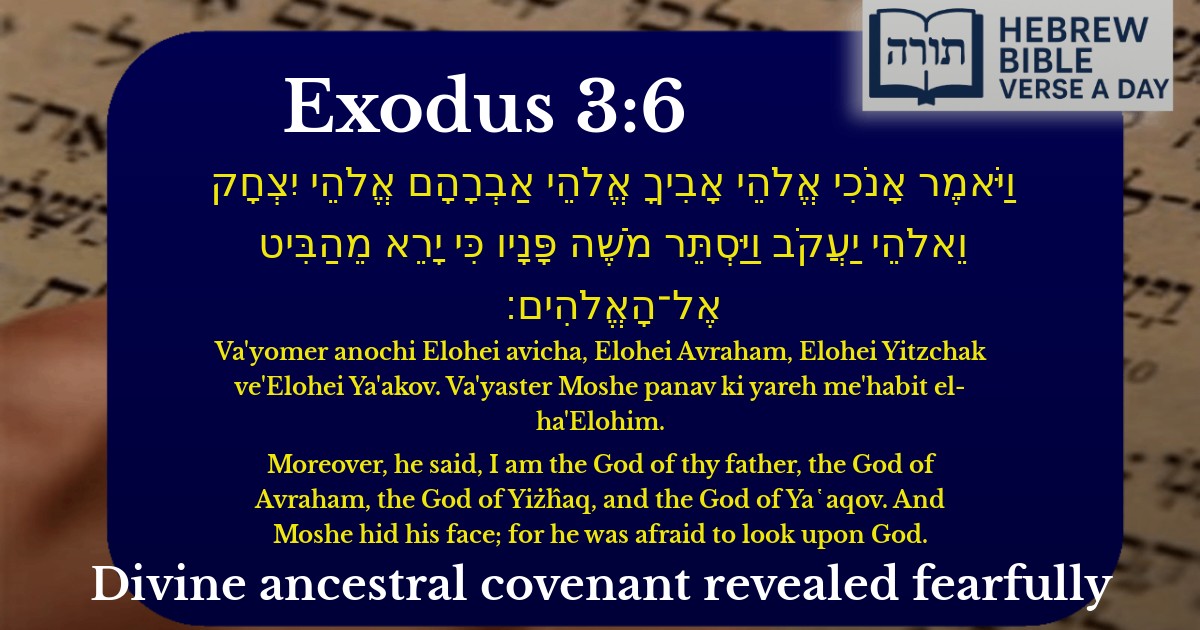Join Our Newsletter To Be Informed When New Videos Are Posted
Join the thousands of fellow Studends who rely on our videos to learn how to read the bible in Hebrew for free!
Hebrew Text
וַיֹּאמֶר אָנֹכִי אֱלֹהֵי אָבִיךָ אֱלֹהֵי אַבְרָהָם אֱלֹהֵי יִצְחָק וֵאלֹהֵי יַעֲקֹב וַיַּסְתֵּר מֹשֶׁה פָּנָיו כִּי יָרֵא מֵהַבִּיט אֶל־הָאֱלֹהִים׃
English Translation
Moreover, he said, I am the God of thy father, the God of Avraham, the God of Yiżĥaq, and the God of Ya῾aqov. And Moshe hid his face; for he was afraid to look upon God.
Transliteration
Va'yomer anochi Elohei avicha, Elohei Avraham, Elohei Yitzchak ve'Elohei Ya'akov. Va'yaster Moshe panav ki yareh me'habit el-ha'Elohim.
Hebrew Leining Text
וַיֹּ֗אמֶר אָנֹכִי֙ אֱלֹהֵ֣י אָבִ֔יךָ אֱלֹהֵ֧י אַבְרָהָ֛ם אֱלֹהֵ֥י יִצְחָ֖ק וֵאלֹהֵ֣י יַעֲקֹ֑ב וַיַּסְתֵּ֤ר מֹשֶׁה֙ פָּנָ֔יו כִּ֣י יָרֵ֔א מֵהַבִּ֖יט אֶל־הָאֱלֹהִֽים׃
Parasha Commentary
📚 Talmud Citations
This verse is quoted in the Talmud.
📖 Berakhot 7a
The verse is discussed in the context of Moses' humility and fear of looking at God, illustrating the proper attitude towards divine encounters.
📖 Sotah 5a
The verse is referenced to emphasize the importance of humility, as demonstrated by Moses hiding his face from God.
📖 Megillah 21a
The verse is mentioned in a discussion about the different ways prophets received divine communication, highlighting Moses' unique experience.


The Divine Introduction and Its Significance
The verse begins with Hashem introducing Himself to Moshe as "the God of your father, the God of Avraham, the God of Yitzchak, and the God of Yaakov" (Shemot 3:6). Rashi explains that Hashem specifically mentions the Avot (forefathers) to emphasize His enduring covenant with them and to reassure Moshe that the same God who guided and protected his ancestors would now redeem Bnei Yisrael from Egypt. The Ramban adds that this formulation underscores the personal relationship Hashem maintained with each of the Avot, recognizing their unique spiritual paths.
Why "God of Your Father" Before the Avot?
The order of the introduction—first mentioning "the God of your father" before listing the Avot—raises a question. The Midrash (Shemot Rabbah 3:6) suggests that Hashem was honoring Moshe's father, Amram, who was a righteous leader of his generation. Alternatively, Ibn Ezra explains that this phrasing was meant to connect Moshe personally to the divine mission by invoking his immediate familial relationship with Hashem before broadening it to the national covenant with the Avot.
Moshe's Reaction: Hiding His Face
The verse states that "Moshe hid his face, for he was afraid to gaze upon God." Rashi comments that this demonstrated Moshe's exceptional humility and reverence, which later merited him the privilege of direct communication with Hashem (as opposed to other prophets who received visions in less direct ways). The Talmud (Berachot 7a) derives from this that one should approach divine service with awe and humility.
Theological Implications of "God of the Avot"
The Netziv (Ha'amek Davar) highlights that by identifying as the God of each forefather individually, Hashem was teaching that divine providence operates differently for each person according to their spiritual level and role. Avraham embodied chesed (kindness), Yitzchak gevurah (strength), and Yaakov tiferet (harmony)—yet all were united in serving the same God.